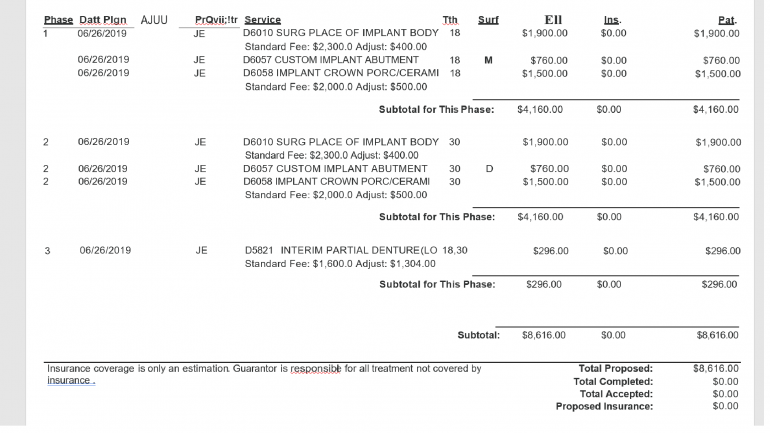
Dental Code D5862: Precision attachment, by report
Dental Code D5862 refers to a specific dental procedure known as precision attachment. This code is used to bill for the placement and use of precision attachments in dental prosthetics. Precision attachments are specialized devices that are used to attach removable dental prostheses, such as dentures or partial dentures, to the patient's natural teeth or dental implants.
What does Dental Code D5862 mean? Detailed Information about the Procedure
Precision attachments, as indicated by Dental Code D5862, are dental devices that offer a more secure and stable method of attaching removable dental prostheses to the patient's existing teeth or dental implants. Unlike traditional methods that rely solely on suction or dental adhesives, precision attachments provide a more reliable and precise attachment mechanism.
Precision attachments are typically employed in cases where the patient requires a removable dental prosthesis, such as a denture or partial denture, but desires a more secure and stable fit. They are particularly useful when there are remaining natural teeth or dental implants that can serve as abutments for the prosthesis. The precision attachments allow for a more precise and controlled fit, enhancing the comfort and functionality of the dental prosthesis.
Precision attachments are commonly used in the following situations
Partial Dentures: When a patient is missing some, but not all, of their natural teeth, precision attachments can be used to secure a partial denture. The attachments provide a stable connection between the remaining natural teeth and the denture, preventing unwanted movement and improving chewing efficiency.
Implant-Supported Dentures: In cases where a patient has dental implants to support their dentures, precision attachments can be utilized to connect the prosthesis to the implants. This provides a secure and reliable attachment, allowing for better stability and function of the denture.
Overdentures: Overdentures are removable dental prostheses that fit over natural teeth or dental implants. Precision attachments can be incorporated into the design of overdentures to enhance their stability and retention. This is especially beneficial when the remaining natural teeth or dental implants are relatively healthy and can provide adequate support for the prosthesis.
Initial Assessment and Treatment Planning
During the initial assessment, the dentist will evaluate the patient's oral health and determine if precision attachments are a suitable treatment option. This comprehensive evaluation involves a thorough examination of the teeth, gums, and jawbone. X-rays and other imaging techniques may be used to assess the condition of the teeth and underlying structures. The dentist will also consider the patient's specific needs and expectations when planning the treatment.
Preparation of the Abutment Teeth
Precision attachments require healthy and stable abutment teeth to provide support for the dental prosthesis. If the patient's natural teeth are being used as abutments, they will need to be prepared to accommodate the attachment. This may involve removing a small amount of tooth structure to create space for the attachment. In some cases, dental crowns may be necessary to strengthen and protect the abutment teeth. The dentist will carefully explain the process and ensure the patient's comfort throughout the preparation phase.
Impression and Laboratory Fabrication
Once the abutment teeth are prepared, the dentist will take an impression of the patient's mouth. This impression captures the exact shape and position of the abutment teeth and surrounding soft tissues. It is crucial to obtain an accurate impression to ensure a precise fit of the precision attachments. The impression is then sent to a dental laboratory, where skilled technicians will fabricate the precision attachments and the corresponding components of the dental prosthesis. The laboratory technicians use the impression as a guide to create custom-made attachments that fit the patient's unique oral anatomy.
Try-In and Adjustment
Once the precision attachments and dental prosthesis components are fabricated, the patient will return to the dentist's office for a try-in appointment. During this visit, the prosthesis will be temporarily placed in the patient's mouth to check the fit, appearance, and functionality. The dentist will make any necessary adjustments to ensure a proper fit and optimal occlusion (bite). This step is crucial to ensure that the dental prosthesis functions well and provides the desired aesthetic outcome. The dentist will take the time to listen to the patient's feedback and address any concerns they may have.
Final Placement and Follow-Up
After the try-in appointment, the precision attachments and dental prosthesis components will be permanently placed in the patient's mouth. The dentist will carefully attach the prosthesis to the abutment teeth using the precision attachments. They will ensure that the prosthesis fits securely and functions properly. The dentist may make further adjustments to optimize the fit and comfort of the prosthesis. Additionally, the dentist will provide the patient with instructions on how to care for and maintain their dental prosthesis. Regular follow-up visits will be scheduled to monitor the condition of the patient's oral health and the performance of the precision attachments.
Summary Dental Code D5862
Dental Code D5862, precision attachment, refers to the use of specialized devices to attach removable dental prostheses, such as dentures or partial dentures, to natural teeth or dental implants. The procedure involves an initial assessment, preparation of the abutment teeth, impression and laboratory fabrication, try-in and adjustment, and final placement. Precision attachments provide stability and support for dental prostheses, improving their function and esthetics. It is essential for patients to consult with their dentist to determine if precision attachments are a suitable treatment option and to ensure proper care and maintenance of their dental prosthesis.
Dr. BestPrice - Empowering you to smile brighter for less! Seamlessly compare dental care expenses, make judicious decisions, and prioritize your budget without sacrificing quality.
